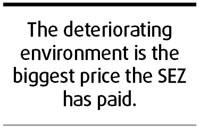A Shenzhen lesson
(China Daily)
Updated: 2008-04-08 07:37
Updated: 2008-04-08 07:37
The apology from the deputy director of Shenzhen municipal bureau of water resources to the citizens of this Special Economic Zone (SEZ) last week is not only a self-criticism of the bureau's inefficiency in water pollution treatment but also a reflection of the lack of attention to the protection of water resources during the zone's development.
As the country's first SEZ, Shenzhen has been a model in both economic development and social progress for other cities. But its over-obsession with economic growth has not expanded this fishing village into a modern metropolis in three decades without paying a price.

The deteriorating environment and degradation of the ecological balance are the biggest price the SEZ has paid. Shift of work priority from economic growth to quality of development and environmental protection is now a must for the city's sustainable future.
Just as the deputy director said, waterways in the city had not been considered an irreplaceable natural resource when the zone was first established in the late 1970s. Instead, rivers were used as a drainage system for sewage and floods, which badly damaged their ability to balance the ecology.
To our regret, the rest of the country has taken the same development path as Shenzhen, although there has been debate about whether to "develop the economy first at the expense of the environment" or "economic development and environmental protection given equal attention".
Shenzhen started to treat its polluted rivers in 2003 and the municipal government promised that water quality would meet the required standard by the year 2010 when the number of sewage treatment plants are increased to 27 with the capacity to treat 4.25 million tons of waste water on a daily basis. But it will still take years for all the rivers to restore their function of balancing the ecology.
While from this delayed apology we see a ray of hope for Shenzhen citizens to have clean rivers in a few years' time, quite a number of other local governments in underdeveloped inland areas, however, are still seeking rapid economic development at the cost of their environments.
The central government has done a great deal in recent years to promote environment awareness among local government leaders, and tough actions are being taken to get their attention.
This apology and the lessons of Shenzhen should be a reminder that we must make sure that the campaign to develop the country's western regions should never shift to the "pollution first model".
(China Daily 04/08/2008 page8)
|
|
|
|